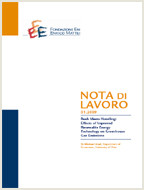Multilateral Bargaining in Networks: On the Prevalence of Inefficiencies

09.06.2015
C72, C78, D72, D74, D85
Noncooperative Bargaining, Coalition Formation, Communication Restriction, Buyout, Network, Braess's Paradox
Climate Change and Sustainable Development
Carlo Carraro
We introduce a noncooperative multilateral bargaining model for a network-restricted environment, in which players can communicate only with their neighbors. Each player strategically chooses the bargaining partners among the neighbors to buy out their communication links with upfront transfers. The main theorem characterizes a condition on network structures for efficient equilibria and shows the prevalence of strategic delays. If the underlying network is either complete or circular, then an efficient stationary subgame perfect equilibrium exists for all discount factors: all the players always try to reach an agreement as soon as practicable and hence no strategic delay occurs. In any other network, however, an efficient equilibrium is impossible for sufficiently high discount factors because some players strategically delay an agreement. We also provide an example of a Braess-like paradox, in which the more links are available, the less links are actually used. Thus, network improvements may decrease social welfare.
